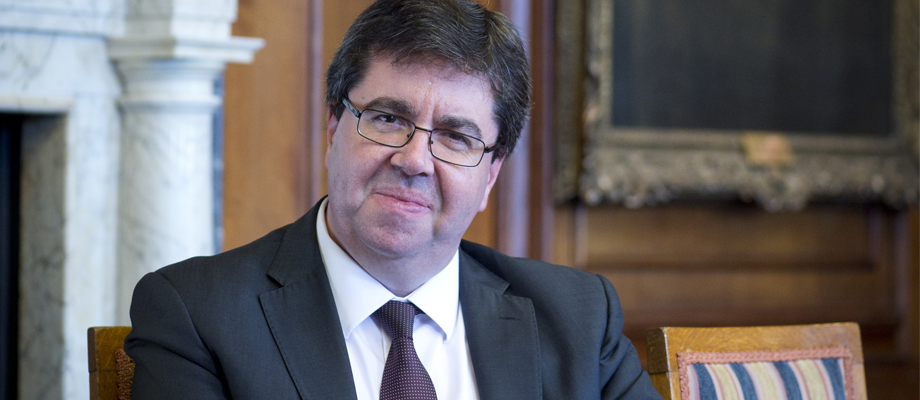
Deputy Vice-Chancellor’s blog: Commitment to investing in mental health
October 27th, 2020
This week I wanted to touch on the issue of mental health. It goes without saying that the pandemic has affected all of us in different ways.
Some of our academic colleagues have carried out research into the impact on frontline workers as well as investigating the links between stress, depression and COVID-19 among the general population.
Colleagues in student support roles have been heavily involved in a City-led campaign around preventing suicide and self-harm among students and we expect, from our own and national data, a greater demand for student wellbeing and support than normal.
We recognise the circumstances relating to the pandemic and the loss of physical social interaction will challenge everyone and that is why we are have made a significant investment to support our wellbeing offer.
The challenges
The University’s own current student survey with 5,376 respondents told us that 82% of them have struggled with their mental health and this has had an impact on their ability to study. Subsequently we expect our new students, post A-level debacle and with increasing pressure to adhere to social distancing requirements, to have far higher levels of stress and anxiety than normal.
For those returning, being back promises a solution to many concerns – being around friends again and in a familiar environment – however the changes we know we are making to incorporate social distancing, increases in online teaching and reduction in facilities students might otherwise enjoy on and off campus mean the environment alone will not be enough. For those coming for the first time, their longstanding expectations of University will be different from the reality of their experience.
Our investment
We have increased capacity in our Mental Health team which is a team of specialist practitioners embedded within the Cripps Medical Centre but operated by Campus Life. These specialists work with those at greatest risk of significant mental ill health.
We’ve focused on making it easier for students to find help with a new set of web pages coupled with providing greater early interventions through pooling of wellbeing officer appointments across the University- this means that rather than being school-specific we now have backup from the whole team to ensure we are available to students and can meet demand. Through the new shared website we can help students find the right support and have set up contact numbers, faculty emails and a live chat facility that also pool resource to make that same resource reach further.
We can now offer up to 300 new style short appointments a week (albeit virtual in many cases) for students to speak about a problem or issue and then either resolve it there, be advised of self-help or be supported in accessing more advanced forms of intervention such as counselling. These appointments will be bookable online to mitigate the need to ‘pop in’ when social distancing does not allow such engagement.
In addition, we are recording demand to give real-time management information and help us provide a more responsive approach.
Our colleagues in Sport have been planning an option for open to all activity given sport is widely recognised as an effective therapy for low-level anxiety or depression. And we continue to develop self-help resources and health improvement information and activities via our Healthy U campaign.
24/7 support
The Students’ Union continue to provide support through their advice services and Nightline service, with the latter offering peer support from 7pm to 8am. We also offer out-of-ours emergency support via Security and in halls via the Wardens and Hall tutors.
To supplement all of this we will be introducing a 24/7 online support system. The service will focus on self and peer help – providing a scalable solution for many students using technology they use in their daily lives. In addition to practical support we hope it will also provide additional reassurance to parents.
While much of this support focuses on students we hope in strengthening these systems we will be able to increase the capacity for staff wishing to access our counselling service, which is an integral part of our provision.
Changes to Recovery Board
This will be my last update as Chair of the Recovery Board. As our academic term is now well underway we have moved our focus from preparations for start of session and will be establishing a new board to mitigate the risks of COVID-19 more generally. I will share updates from these meetings, as appropriate, going forwards.
Finally I am delighted to report the outcome of a very positive Health and Safety Executive visit last week. The HSE were satisfied that the University Covid-Secure measures met their standards and raised no concerns – which is the best outcome we could have achieved. This is down to the hard work of our health and safety team working closely with so many of you. Thank you to everyone involved, and to all of those who are working with and following our guidelines to make sure our campus is safe for everyone.
Professor Andy Long
Provost and Deputy Vice-Chancellor
Tags: coronavirus support, deputy vice chancellor, Deputy Vice Chancellor's blog, DVC blog, mental health, recovery, support
One Comment
Leave a Reply
Other

Need news? See you on SharePoint
After 14 years of service, Campus News is being retired as the university’s staff news platform. […]

Roads and car parks closed for refurbishing work
As part of ongoing road improvements at the university, works will be taking place to resurface […]


March 12th, 2021 at 1:18 pm
John
Wow! Thanks for the information. Investing in mental health is important these days.